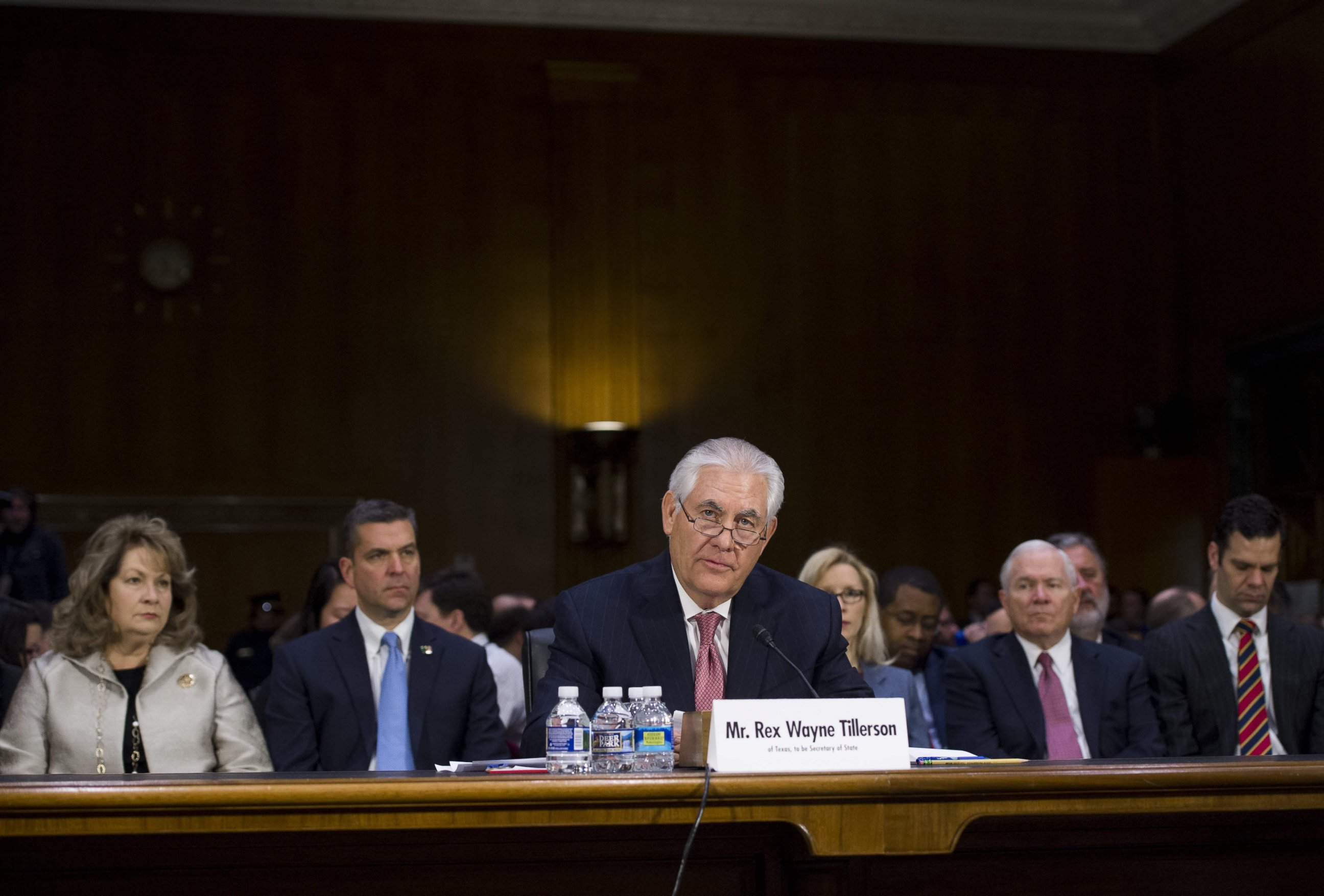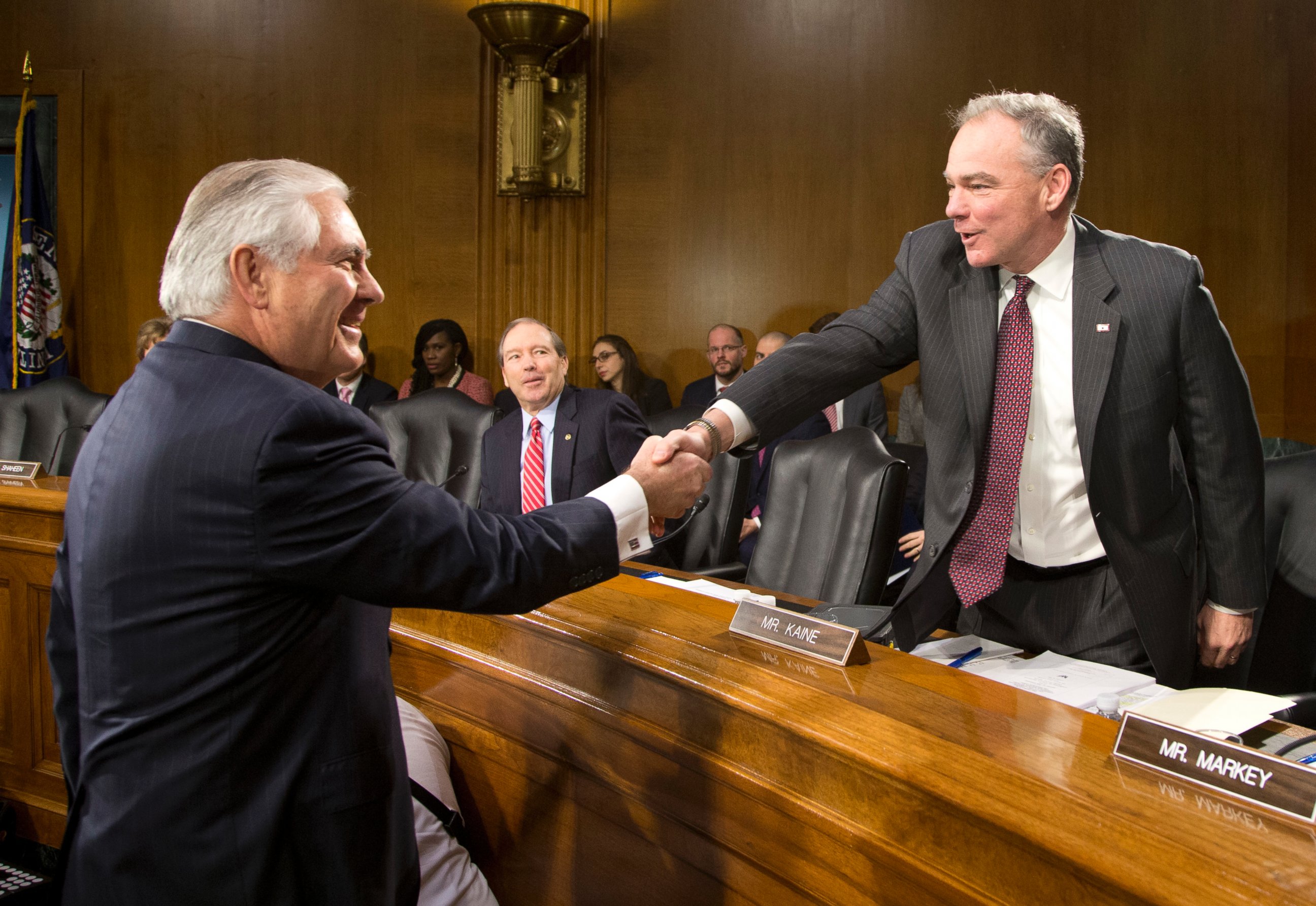ANALYSIS: Rex Tillerson Is More Hawkish Than Expected but Still Good News for Russia
More hawkish than expected, but his pick would still likely please Moscow.
— -- Rex Tillerson’s nomination as Donald Trump’s secretary of state has been described by some analysts as a gift for the Kremlin. The oil executive worked profitably for years with Russia’s leadership as head of ExxonMobil, and has been an open proponent of lifting American sanctions on Moscow.
Tillerson’s good relations with Vladimir Putin -- the Russian president awarded him an Order of Friendship -- as well the fact that the company where he spent his career stands to receive a windfall of hundreds of millions of dollars if sanctions on Moscow are lifted, has left some in the U.S. government concerned that he might be too soft on Russia.
It was unsurprising then, with his potential boss fighting unverified claims he is beholden to Moscow, that Tillerson at his Senate confirmation hearing on Wednesday took a more hawkish line on Russia than might have been predicted, using it to describe Russia as in many ways fundamentally opposed to the U.S. and promising he would have been tougher on the Kremlin over its invasion of Crimea than the current administration.
But while the encounter was a cosmetically bruising one for Russia, behind the harder statements, there’s much reason to think the Kremlin will still regard Tillerson's appointment as good news after the performance in front of the committee.
“It is what we expected,” said Sergei Markov, a pro-Kremlin analyst and former government adviser. “Tillerson is a businessman who solves the problems he faces. Now, he faces the problem to be approved or not approved by a Senate committee. He is solving that problem.”
There was little doubt in the course of the hearing that Tillerson was being careful. Tillerson was pressed by senators, particularly Republican Sen. Marco Rubio, on a spectrum of Russian wrongs alleged under Putin: murdering opponents, meddling in the U.S. elections, invading Ukraine and other neighboring countries and bombing civilians in Syria.
Tillerson did not take the initiative in bashing Moscow, but he was also careful to accept almost all the heavy criticisms of Russia put to him by the senators, largely acknowledging them without adding to them.

On some issues, notably Syria, Tillerson also refused to join the attacks, placing himself behind a claim that he was not yet informed enough to make a call on whether Putin should be considered a war criminal for the bombing of civilians in the city of Aleppo.
“I would not use that term,” Tillerson said.
That sat badly with Rubio.
“It should not be hard to say that Vladimir Putin’s military has conducted war crimes in Aleppo,” the Florida senator said. “The videos and the pictures are there.”
But on the issue of Ukraine, Tillerson was surprisingly hawkish, saying he would have advocated sending lethal aid to the Ukrainian army following Russia’s seizure of Crimea, something the Obama administration has balked at. He also stated unequivocally that Russia's invasion of Ukraine had broken international law and it had no right to the peninsula.
Those comments will have irked Moscow and they burnished Tillerson's claim he won't be a push-over. But in reality, while he managed to tick necessary boxes on Russia's wrongdoings, for the Kremlin, they will have been outweighed by the position he did not move on -- that is, lifting sanctions on Moscow over its invasion of Crimea.
Tillerson’s opposition to the sanctions is well-established. Under his leadership, Exxon lobbied hard and successfully for one of its deals in Russia, worth hundreds of millions of dollars, to be temporarily exempted from the sanctions. Tillerson himself has publicly criticized the measures, also braving White House disapproval to attend an economic forum in St. Petersburg last year to appear alongside one of Putin’s right hand men, Igor Sechin, who heads the Russian energy giant, Rosneft.
There were few signs at the hearing that Tillerson’s position had changed. Asked repeatedly by Rubio to guarantee that he would maintain economic sanctions long-term on Russia, Tillerson refused to make the pledge, conceding only that a Trump administration would likely keep the “status quo” until it had developed its Russia policy.
For the Kremlin, which has been expending considerable efforts trying to undo European Union solidarity on the sanctions regime, that will be of far more importance than almost any of Tillerson’s tougher comments.
That's why on Thursday, the Putin's spokesman, Dmitry Peskov, while rebuking Tillerson on Crimea, made the thrust of his comments that Moscow still looks forward to new opportunities for working with the U.S.
Russian officials are also conscious that Tillerson and Trump in any case will face a struggle to dismantle sanctions. Many are imposed by Congress, which -- with Moscow accused of mounting an unprecedented attack on the U.S. elections -- will have many lawmakers on Capitol Hill calling for more measures not fewer.

Before the hearing (and for some still after) critics have viewed Tillerson as a potential stooge for Moscow, but the reading of Russia he presented in the hearing was judged by many observers as realistic and accurate. For them, rather than a wish for an alliance with Moscow, the defining feature of Tillerson's pitch seemed the absence of the aspiration to change Russia, suggesting that the U.S. would take the country as it is.
“It’s not likely we will ever be friends,” Tillerson told the committee of Russia, saying there were areas where the two countries were fundamentally opposed. His goal, he said, was to move the U.S. to being “sometimes partners," rather than “always adversaries.”
“My impression overall was this is a guy who really does know Russia,” said Matthew Rojansky, an expert on Russia who is director of the Kennan Institute at the Wilson Center.
“There was a line in his written testimony that I loved,” Rojansky said. "'We did not recognize that the Russians do not think like us.' That is a realistic view on Russia! He’s clear-eyed,” Rojansky said. He added he felt it contrasted favorably with the outgoing administration, which he criticized for making policy on wishful thinking that Russia was little different from the U.S. if only Putin were not present.
That will be cold comfort for many of those who believe America ought to use its power to encourage democratic practices in the world, but the Kremlin will have liked it.
A reserved policy, with little aspiration to alter Russia, coupled with an easing of sanctions, will already be a major improvement on the current situation from Moscow’s perspective.
“All presidents of the United States after the Cold War -- Clinton, George W. Bush and to a certain extent Obama -- they assumed that Russia should change,” Fyodor Lyukhanov, a Russian analyst who sometimes advises on government foreign policy, said in an interview with ABC News last month.
“Trump is totally different. He says publicly many times that it’s up to other countries how to live and it’s absolutely not our business to try to change the world. And this, I think, in Russia is perceived as very promising.”
Editor's note: An earlier version of this article incorrectly described Matthew Rojansky as an expert at the Brookings Institution. He is director of the Kennan Institute at the Wilson Center.




